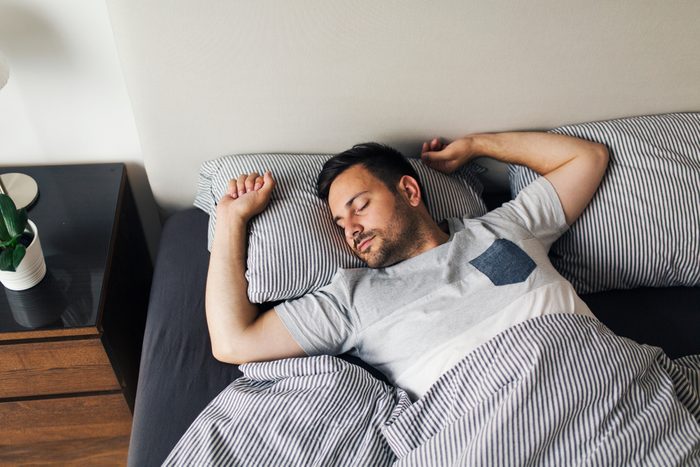
Getting better rest
Every night when the lights go down, about half of adults start snoring. When you snore, it means air isn’t flowing as it should through the back of the throat. Snoring ruins sleep for some 90 million Americans. Sometimes, in as many as half of all cases, snorers may have obstructive sleep apnea (OSA), a serious condition in which your throat muscles relax and block your airways while you sleep. Here’s what doctors wish you knew so you—and your partner—can sleep better at night.

Snoring affects the roadways
According to the National Highway Traffic Safety Administration, drowsy driving was responsible for 91,000 accidents in 2017. These might have been preventable, according to Ronald L. Rosenthal, DDS, FAGD, retired dentist, author, and speaker. “Snoring is a cardinal sign of obstructive sleep apnea. Eight hundred Americans die in drowsy driving accidents yearly due to OSA,” he says. With sleep apnea, the airways collapse and block breathing. Sufferers will snore loudly and actually stop breathing several times an hour. They never reach deep sleep and feel constantly tired. Even worse, they’re at much higher risk for weight gain, heart disease, and other chronic disorders. Learn other signs of sleep apnea you might be ignoring.
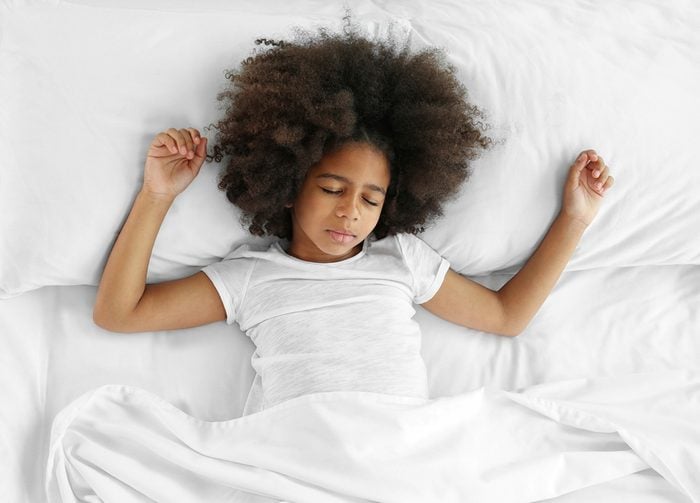
All ages are at risk
Though you might think snoring is an older person’s problem, the truth is that all ages are at risk for sleep apnea. “Sleep apnea can affect anyone at any age level or body weight, and you should get tested if you experience any symptoms related to sleep apnea,” says Joseph Krainin, MD, FAASM, Chief Medical Advisor for SoClean (a company that sanitizes sleep apnea devices), and founder of Singular Sleep. “Not only does sleep apnea reduce your quality of life, it can cause or worsen many medical problems.” Learn more about sleep apnea types and treatment.
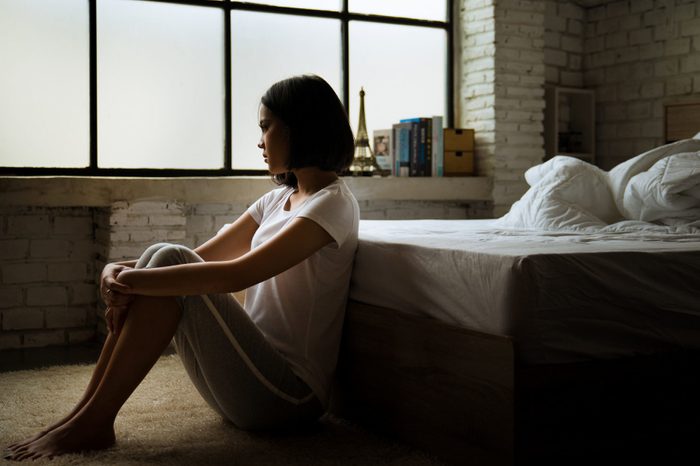
Sleep apnea might be the cause of your depression
A 2012 study of 9,714 American adults by the Centers for Disease Control and Prevention (CDC) was the first major research to analyze the link between sleep apnea and symptoms of major depression. “Snorting, gasping, or stopping breathing while asleep was associated with nearly all depression symptoms, including feeling hopeless and feeling like a failure,” lead author Anne G. Wheaton, PhD, told the National Sleep Foundation. A 2014 study published in the Journal of Research in Medical Sciences found that about 46 percent of people with OSA had depressive symptoms. Check out the 8 things these sleep disorders could mean for your health.
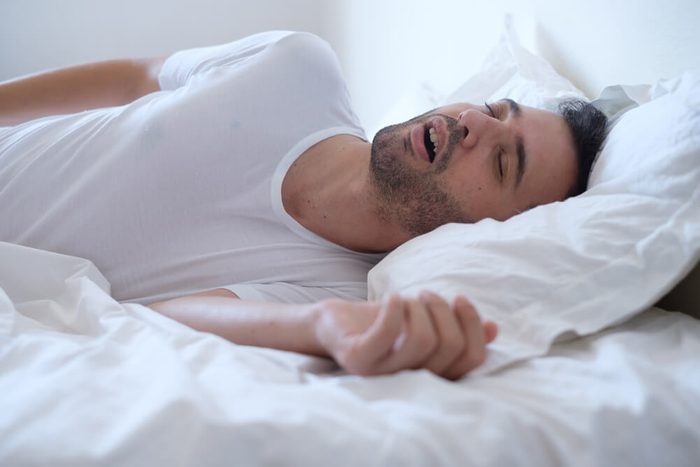
No snoring doesn’t mean you’re in the clear
Although loud snores are a symptom of sleep apnea, a silent night doesn’t mean you don’t have it, says W. Chris Winter, MD, neurologist, sleep specialist, and author of The Sleep Solution: Why Your Sleep Is Broken and How To Fix It. “Just because you don’t snore does not mean you do not have sleep apnea. If you are tired and sleep poorly, insist on a sleep study, even if you don’t look like a typical sleep apnea patient,” recommends Dr. Winter. Here are some more things sleep doctors wish you knew about how to sleep better.

Snoring affects your heart health
While you sleep, your body undergoes restorative processes that affect your entire body—including your heart. Ellen Wermter, NP, practicing at Charlottesville Neurology and Sleep Medicine, advises patients not to forget how sleep—or the lack of it—matters. “Studies show that snoring can alter the inner lining in the carotid arteries, making them more apt to develop atherosclerotic lesions and increasing the risk of stroke,” she says.

Sleep aids and alcohol make snoring worse
If you’re thinking of taking medication or having a drink to help you fall asleep—don’t. Sleep aids often have the reverse effect on those with sleep disorders, says Wermter. “Don’t drink alcohol within three to four hours of bedtime or take sedatives or hypnotics, as these further slacken upper airway structures and harm sleep quality,” she says. “Sleep aids (such as over-the-counter drugs with ‘PM’ in the label) also have sedative effects and can exacerbate snoring. You’re best off avoiding using these.” Here are some more effective home remedies for snoring.

Hydration is key
You know that staying hydrated is important, but you may not realize it will help you sleep. Make sure you’re hydrating properly, or you might make the problem worse, according to Wermter. “Stay hydrated—thick mucus worsens snoring,” she suggests. “Don’t drink large quantities too close to bedtime though, and avoid caffeinated beverages later in the day, as they contribute to wakefulness and also have a diuretic effect.” Here are 7 ways to stay hydrated (besides drinking water).
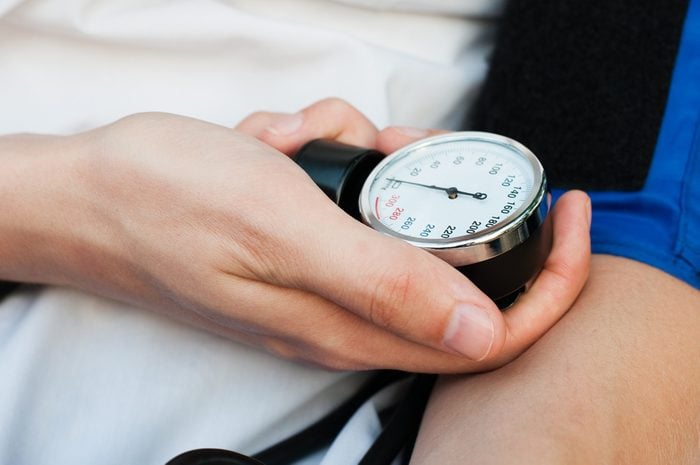
Know your risk factors
The risk for sleep apnea tends to climb if you’re overweight, if your blood pressure is high, and with age, explains Sara Nowakowski, PhD, MS, clinical psychologist, sleep expert, and assistant professor at the University of Texas Medical Branch. “Approximately 20 percent of adults snore and 60 percent of men over the age of 40 snore regularly. While not everyone who snores has sleep apnea, snoring is a warning sign that should be taken seriously,” she says. “Other signs to look out for are daytime sleepiness, excess body weight, and a diagnosis of high blood pressure (about one in three individuals with high blood pressure also has sleep apnea).” Make sure you know the 13 potentially damaging consequences of undiagnosed sleep apnea.

Snoring can cause premature death
Snoring isn’t only annoying for your partner—it can be life-threatening, Nowakowski warns. “People whose snoring is caused by sleep apnea have a 40 percent greater chance of premature death. Thus, it is important to report snoring and other possible apnea symptoms to your physician. A sleep study to further evaluate sleep apnea may be recommended. It is important to follow through and seek treatment if warranted.” Check out these snoring remedies you probably haven’t tried.

Snoring is the result of weak muscles
Aging muscles play a role in sleep apnea. “As we get older, our muscles lose tone, including the muscles of our throat (airway),” explains Steven Olmos, DDS, founder of TMJ & Sleep Therapy Centre International. “The incidence of breathing disorders like obstructive sleep apnea (OSA), upper airway resistance, and snoring increases with age.”
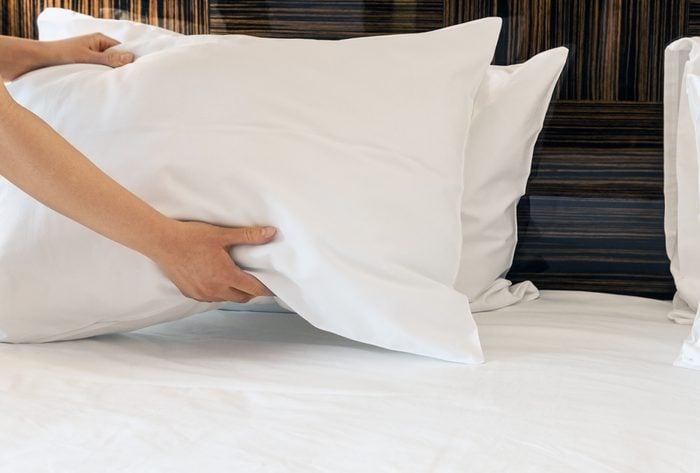
Your pillow is not the problem
When you sleep poorly, you tend to blame everything but the actual culprit, Dr. Olmos says. “Disturbances of sleep result in fatigue, anxiety, and facial pain upon awakening. We chalk this up to our beds, our pillows, stress, or just old age,” he explains. “The thing is, a person with a sleep-breathing problem has likely had it all their life—it is just getting worse with age. It is possible to improve sleep and breathing as you age. I sleep better at 62 than when I was 30 because my sleep-breathing problem is being treated.” Watch out for the 11 health conditions that could be messing with your sleep.
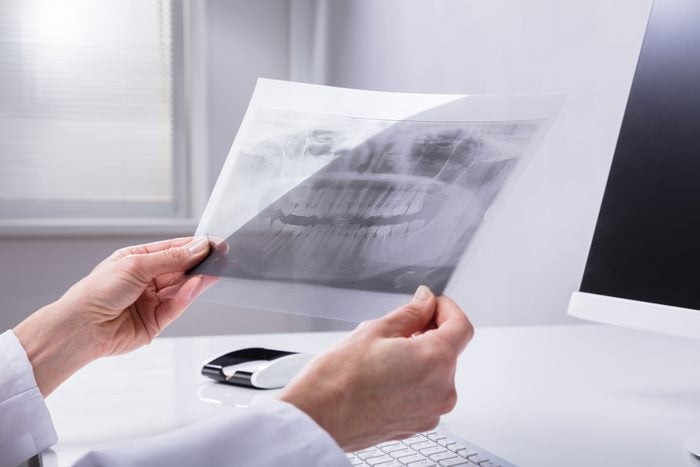
Sleep apnea can hurt your teeth
All that snoring can lead to grinding, according to Gene Sambataro, DDS, author of Stop the Snore: Dental Solutions for Healthy Sleep. He explains, “Sleep apnea sufferers may awake with sensitive teeth or tight jaw muscles. It happens because the breathing airway is obstructed.” The National Sleep Foundation found that about one in four people with obstructive sleep apnea grinds their teeth at night. Consider these 10 home remedies for sleep apnea.
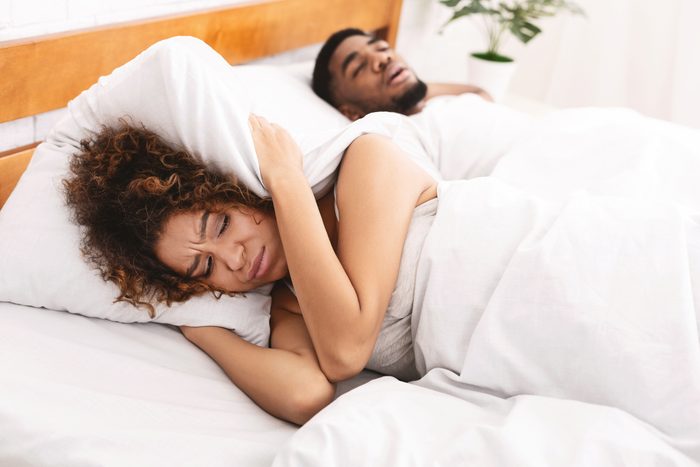
Snoring can ruin your day
There are so many ways that snoring can mess up your daily life. “If your spouse is snoring and you can no longer get the sleep you need, if you’re falling asleep at the wheel, if you’re dragging yourself through the day, then your health may be compromised by a sleeping disorder,” Dr. Sambataro says. “And that’s something that’s going to have long-term consequences if not addressed soon.” Learn about the 12 sleep disorders that aren’t sleep apnea.
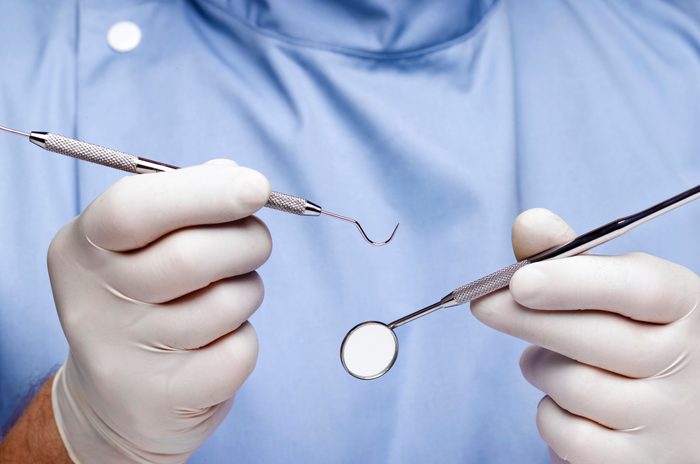
It’s a partly dental issue
Your doctor may send you to a dentist to get an oral appliance, but it should be diagnosed with a sleep study first. “Since the tongue and jaws fall under the domain of dentistry, obstructive sleep apnea can be treated by dentists,” Dr. Rosenthal says. A doctor might prescribe a CPAP (Continuous Positive Air Pressure) machine with a mask blowing air into your nose all night. “Oral appliances for OSA are now considered as good as CPAP in the treatment of mild to moderate OSA,” Dr. Rosenthal says. “Oral appliances are an acceptable treatment of severe OSA in patients who can not tolerate CPAP.” Here are 7 great things that could happen once you get a CPAP machine.
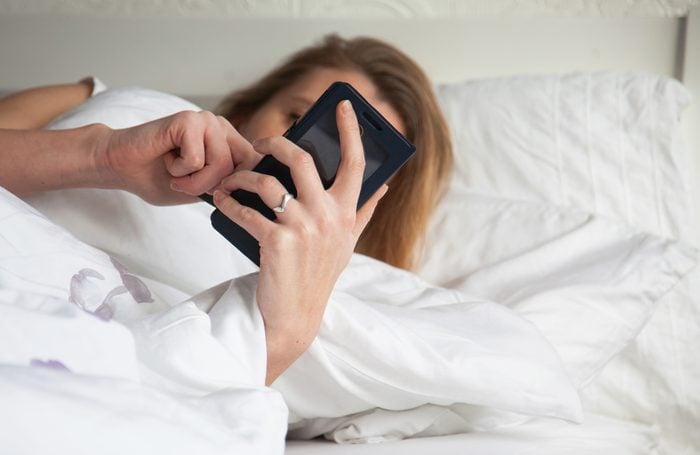
You could try an app
Using technology can provide more information than simply relying on what others say about your sleep, says Chris Brantner, a certified sleep science coach and founder of SleepZoo. “While you can have your partner listen for symptoms,” he says, suggesting, the Sleep Cycle app. “This app, which tracks your sleep and helps ease you awake, also listens for your snoring. It will tell you how much you snored during the night, as well as record snippets of your snoring. This can be a good way to get a realistic picture of what your snoring is like.”
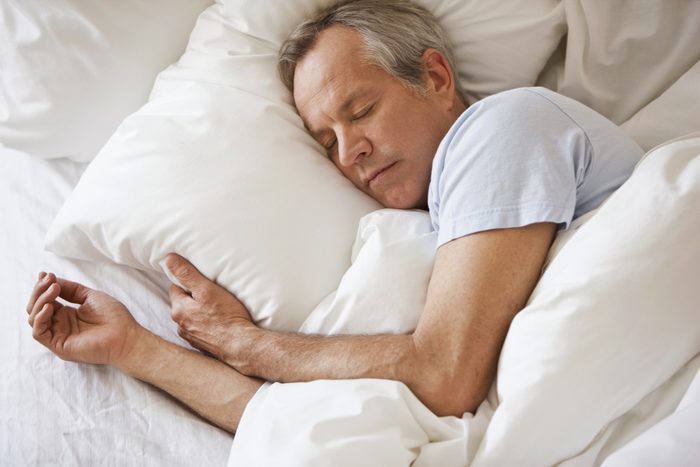
Treatment is available and often simple
“There are several treatment options available for snoring,” explains Neil Kline, DO, spokesperson for the American Sleep Association. “For some, lifestyle modifications like weight loss, position change, and avoiding alcohol might help. For others, snoring mouthpieces can be very effective. Another option is upper airway surgery for snoring.” Next, check out the 11 simple solutions to stop snoring now.

